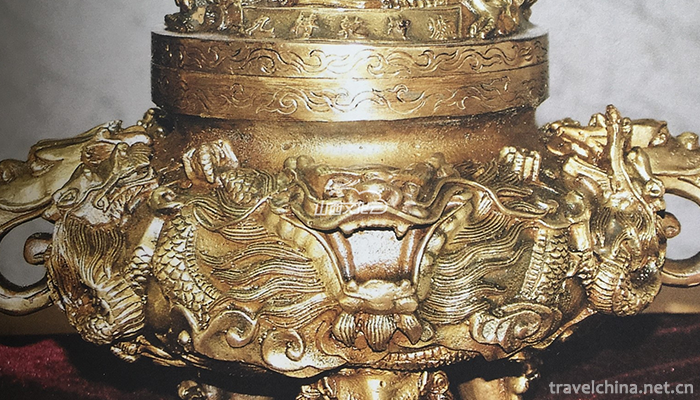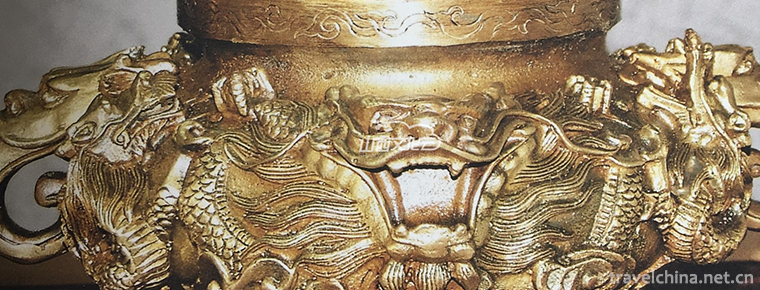Bronze Ware Making Skills Datong Copper Ware Making Skills
Bronze Ware Making Skills Datong Copper Ware Making Skills
Provincial batches: the second batch at the provincial level
National batches: the fourth batch at the national level
(From Shanxi Cultural Cloud)
Datong bronze ware is a traditional handicraft of the Han nationality. It has a long history and exquisite craftsmanship. As early as the Northern Wei Dynasty, it enjoyed a great reputation. Since the Tang and Song Dynasties, Datong bronze ware has been sold well all over the country. So far, folk slang has been circulating about "watching Buddha scenery on Wutai Mountain and buying bronze ware in Datong City".
During the Northern Wei Dynasty, there was a copper-cast Buddha statue in Datong. Military craftsmen in Xijing (now Datong City) of Liao Dynasty were able to make guns, crossbows and other weapons. In the early Yuan Dynasty, there were 760 copper smelters in Datong. By the Ming and Qing Dynasties, bronze wares penetrated into all aspects of life at that time. Weapons, containers, production tools, daily necessities and decorations are all available. Datong Courtyard Lane is called "Bronze Craftsman Street". There are dozens of bronze craftsmen shops in the 100-meter-long street, gathering hundreds of skilled craftsmen.
Datong Copper Hotpot is a representative work of Datong Copper Wares. It consists of chassis, pot body, fire seat, copper cover, fire drum and small cover. On the chassis, pot body, pot cover and small cover, the designs of "Dragon and Phoenix Chengxiang", "Magpie Dengmei", "Eight Immortals Crossing the Sea" and "Flowers and Birds Landscape" are engraved respectively. Its production processes are shaping, casting, welding, tin plating, chips, polishing, assembly and so on. Its beautiful shape, exquisite craftsmanship, durable, with strong national and local characteristics, deeply loved by customers. When Premier Zhou Enlai accompanied French President Pompidou on his visit in 1973, he presented the bronze hotpot carved with the pattern of "Nine Dragons Fighting Moon" to President Pompidou as a gift.


-
1.Fish egg powder
Fish egg powder was originally a food in Chaozhou. It began to spread to Guangzhou in the Guangxu period. Today, the operation of Chaozhou
Time 2018-11-14 -
2.Chaoyang Park Beijing Sun Park
Chaoyang Park in Beijing is a comprehensive and multi-functional cultural recreation and entertainment park with gardening as the main part. It is the largest city park within the Fourth Ring Road in
Time 2019-01-05 -
3.Chongli Wanlong Skiing Ground
Wanlong ski resort is located in Honghua Liang, Chongli District, Zhangjiakou City, Hebei Province. It covers an area of more than 30 square kilometers, with the highest elevation of 2110.3 meters and
Time 2019-01-06 -
4.Jiangwan Scenic Area of Wuyuan
Jiangwan Scenic Area is located in the northeast of Wuyuan County, Jiangxi Province, Shangrao City. It is an ancient village with rich Huizhou culture. Up to now, the village has preserved a large num
Time 2019-01-21 -
5.Li Zhuang ancient town
Lizhuang, an ancient town precipitated by cultural and historical relics, is an ancient town that tells stories and vicissitudes of the Anti-Japanese War. It is an ancient town that reflects Chinese t
Time 2019-01-29 -
6.Suzhou suburb mudu town
Mudu Ancient Town, nicknamed Duchuan, Xujiang and Xiangxi, is located in the southeast of Jiangsu Province and the west of Suzhou Ancient City. Located in the Taihu Lake Basin
Time 2019-02-07 -
7.Jingzhou Huagu Opera
Jingzhou Huagu Opera, a local traditional drama in Hubei Province, is one of the national intangible cultural heritage.
Time 2019-05-08 -
8.Manas
Manas, the traditional folk literature of Kirgiz Autonomous Prefecture in Kizlesu, Xinjiang, is one of the national intangible cultural heritage.
Time 2019-05-16 -
9.Deng Xiaoping
Deng Xiaoping (August 22, 1904 -1997 February 19th), formerly known as Deng Xiansheng, the scientific name of Deng Xixian, Guang'an, Sichuan. Go to Europe early Work study program After his return, he
Time 2019-09-07 -
10.Anhui University Of Technology
Anhui University of Technology is located in Anhui province. Ma'anshan The city is a multi-disciplinary university characterized by industry and industry. Ministry of science and technology With the s
Time 2019-10-10 -
11.Music that Ding Zhen likes
Zhaxi Dingzhen (Chinese Name: Ding Zhen), Tibetan, lives in Litang County, Ganzi Prefecture, Sichuan Province.
Time 2020-12-07 -
12.Introduction to Chinese embroidery
Embroidery, known as needle embroidery in ancient times, is a kind of technology that uses embroidery needle to guide color thread, embroiders the designed patterns on textiles, and forms patterns with embroidery traces. In ancient times, it was called "Juju" and "pinju".
Time 2020-12-12